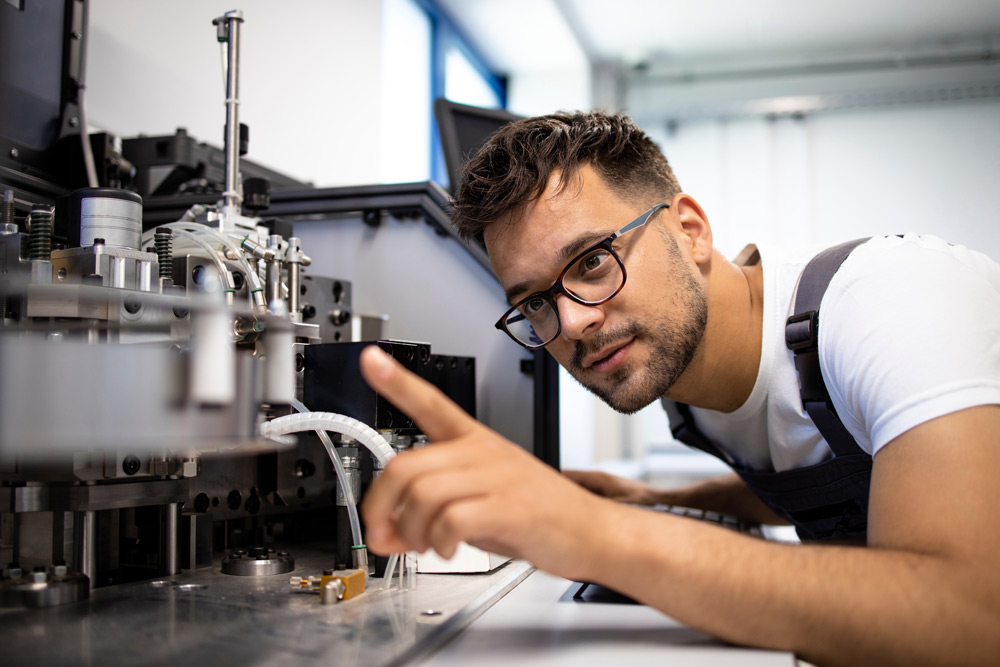
Mechatronics are all around us every day. You probably even use it with your smartphone, or perhaps you’ve tried a VR reality headset. These are examples of how mechatronics affects consumer electronics, but what exactly is Mechatronics Engineering?
Mechatronics engineering combines several different branches of engineering: mechanical engineering, electrical engineering, electronic engineering and software engineering. The word "mechatronics" was coined by Tetsuro Mori, a senior engineer at the Japanese company Yaskawa Electric, in 1969. Early uses of mechatronics included integrating sensors and feedback control systems into mechanical devices. These early applications led to the automation of manufacturing processes. Today we see mechatronics used in our daily lives from healthcare to consumer electronics to the cars we drive.
What do Mechatronics Engineers Do?
Mechatronics Engineers work in these industries to use a multidisciplinary and systems-based approach to develop devices we use daily. They design systems that automate industrial tasks and can work in a variety of settings. In addition, they improve the production of goods and services by both designing new systems and providing recommendations for improving existing systems.
These applications span several industries. In the automotive, mechatronics designs adaptive cruise control and lane assist features, which paves the way for self-driving cars. We also see mechatronics used in healthcare from medical devices that monitor patients’ health to robots that assist in surgery. Additionally, aerospace uses these technologies in aircraft navigation systems and to operate unmanned aerial vehicles, better known as drones. Even the environment benefits from mechatronics being used for solar tracking and smart grids to improve sustainability and create renewable energy sources.
Because mechatronics focuses on improving performance and efficiency in various industries, it’s well suited to contribute to AI’s integration into various fields. Automation is becoming more and more common to help us make daily tasks easier and more productive. Mechatronics engineers play a key role in making sure that automation is handled effectively. These engineers create complex systems by developing smarter and more capable machines and products.
How do I become a Mechatronics Engineer?
If you’re interested in pursuing a career in mechatronics engineering, you can start that journey by earning an associate degree in Electronics Engineering Technology with a concentration in Mechatronics Engineering at ECPI University. You can also pursue a bachelor’s degree in Mechatronics. The associate degree takes only 18 months to complete, and the bachelor's degree can be completed in 2.5 years. Both offer hands-on experience with practical simulations and real-world case studies.
You will be well prepared for the curriculum through first learning about electric circuits to electronic system applications to digital systems. Classes like introduction to programming and networking give students the basis to understand the multi-faceted world of mechatronics before moving on to 3D labs, statics, hydraulic and pneumatic systems. The goal is to offer a well-rounded wealth of knowledge to prepare students for the many applications that mechatronics offers.
The four main branches of mechatronics are electrical, mechanical, electronic, and software engineering. Specializations include the automotive industry, artificial intelligence, telecommunications, robotics, and consumer electronics. Mechatronics engineers are in high demand and many times find employment as engineering consultants, project managers, industrial engineers, or as electrical/ computer engineering technologists.
To pursue a career in this field, first earn a degree in Mechatronics Engineering. Then, you will be prepared to take the Fundamentals of Engineering (FE) exam administered by the National Council of Examiners for Engineering and Surveying (NCEES). While not a requirement, this can benefit your career path. Get professional work experience in the field, and then you can qualify for the Physical Engineers (PE) exam. These steps will set you up for success in the field.
How does a Mechatronics Technician differ from a Mechatronics Engineer?
The primary role of a Mechatronics Technician is to install, maintain, and repair automated machinery and computer-controlled mechanical systems. Typically, this is done in industrial settings. They also test, operate, or maintain robotic equipment on site. Their responsibilities can include designing and testing new processes for automated systems, along with analyzing and solving issues with existing ones.
Some people opt to transition from a Mechatronics Technicians to a Mechatronics Engineer. The path for this is to pursue a bachelor’s degree in Mechatronics Engineering. Many technicians choose to advance their careers by pursuing higher qualifications and embracing more complex responsibilities. Their real-world experience in the field also helps them achieve this goal.
Mechatronics in Engineering encompasses so many aspects of our daily lives and promises to yield innovative discoveries for our future. Its strong emphasis on automation and developing smarter, more efficient systems will have a critical role in shaping how we manufacture products, conduct business, and interact with one another. It even creates healthier and more sustainable futures with its applications in the healthcare and environmental fields. Ultimately, securing a degree in the Mechatronics Engineering field is highly rewarding in both the wide scope of opportunities available and its highly sought-after skillsets. ECPI University is ready to lead you to an exciting new career path in Mechatronics, are you?

